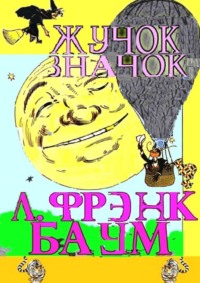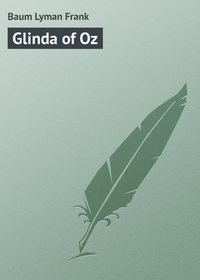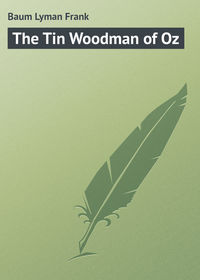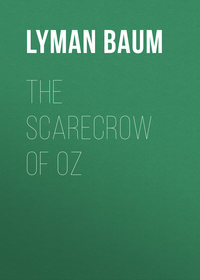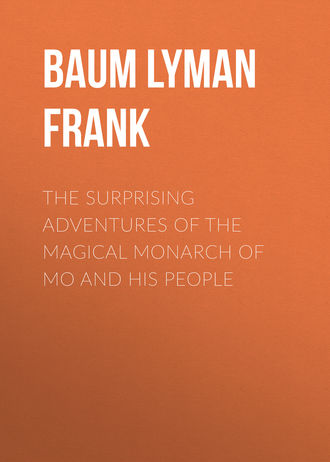 полная версия
полная версияThe Surprising Adventures of the Magical Monarch of Mo and His People
That was the last our Prince ever saw of the strange country of the monkeys, for the wind carried his kite straight back to the Valley of Mo. When Zingle found himself above his father's palace, he took out his pocket-knife and cut the string of the kite, and immediately fell head foremost into a pond of custard that lay in the back yard, where he dived through a floating island of whipped cream and disappeared from view.
Nuphsed, who was sitting on the bank of the custard lake, was nearly frightened into fits by this sight; and he ran to tell the King that a new meteor had fallen and ruined one of his floating islands.
Thereupon the monarch and several of his courtiers rushed out and found Prince Zingle swimming ashore; and the King was so delighted at seeing his lost son again that he clasped him joyfully in his arms.
The next moment he regretted this act, for his best ermine robe was smeared its whole length with custard, and would need considerable cleaning before it would be fit to wear again.
The Prince and the King soon changed their clothes, and then there was much rejoicing throughout the land. Of course the first thing Zingle asked for was something to eat, and before long he was sitting at a table heaped with all sorts of good things, plucked fresh from the trees.
The people crowded around him, demanding the tale of his adventures, and their surprise was only equaled by their horror when they learned he had been captured by a band of monkeys, and shut up in a cage because he was thought to be a dangerous wild beast.
Experience is said to be an excellent teacher, although a very cruel one. Prince Zingle had now seen enough of foreign countries to remain contented with his own beautiful Valley, and, although it was many years before he again attempted to fly a kite, it was noticed that, when he at last did indulge in that sport, the kite was of a very small size.
The Thirteenth Surprise
THE
STOLEN PLUM PUDDING
THE King's plum-pudding crop had for some time suffered from the devastations of a secret enemy. Each day, as he examined the vines, he found more and more of the plum-pudding missing, and finally the monarch called his Wise Men together and asked them what he should do.
The Wise Men immediately shut their eyes and pondered so long over the problem that they fell fast asleep. While they slept still more of the plum-pudding was stolen. When they awoke the King was justly incensed, and told the Wise Men that unless they discovered the thief within three days he would give them no cake with their ice-cream.
This terrible threat at last aroused them to action, and, after consulting together, they declared that in their opinion it was the Fox that had stolen the pudding.
Hearing this, the King ordered out his soldiers, who soon captured the Fox and brought him to the palace, where the King sat in state, surrounded by his Wise Men.
"So ho! Master Fox," exclaimed the King, "we have caught you at last."
"So it seems," returned the Fox, calmly. "May I ask your Majesty why I am thus torn from my home, from my wife and children, and brought before you like any common criminal?"
"You have stolen the plum- pudding," answered the King.
"I beg your Majesty's pardon for contradicting you, but I have stolen nothing," declared the Fox. "I can easily prove my innocence. When was the plum-pudding taken?"
"A great deal of it was taken this morning, while the Wise Men slept," said the King.
"Then I can not be the thief," replied the Fox, "as you will admit when you have heard my story."
"Ah! Have you a story to tell?" inquired the King, who dearly loved to hear stories.
"It is a short story, your Majesty; but it will prove clearly that I have not taken your pudding."
"Then tell it," commanded the King. "It is far from my wish to condemn any one who is innocent."
The Wise Men then placed themselves in comfortable positions, and the King crossed his legs and put his hands in his pockets, while the Fox sat before them on his haunches and spoke as follows:
"It has been unusually damp in my den of late, so that both my family and myself have suffered much. First my wife became ill, and then I was afflicted with a bad cold, and in both cases it settled in our throats. Then my four children, who are all of an age, began to complain of sore throats, so that my den became a regular hospital.
"We tried all the medicines we knew of, but they did no good at all. My wife finally begged me to go to consult Doctor Prairiedog, who lives in a hole in the ground away toward the south. So one morning I said good by to my family and ran swiftly to where the doctor lives.
"Finding no one outside the hole to whom I might apply for admission I walked boldly in, and having followed a long, dark tunnel for some distance, I suddenly came to a door.
"'Come in!' said a voice; so in I walked, and found myself in a very beautiful room, lighted by forty-eight fireflies, which sat in a row on a rail running all around the apartment. In the center of the room was a table, made of clay and painted in bright colors; and seated at this table, with his spectacles on his nose, was the famous Doctor Prairiedog, engaged in eating a dish of stewed snails.
"'Good morning,' said the Doctor; 'will you have some breakfast?'
"'No, thank you,' I replied, for the snails were not to my liking; 'I wish to procure some medicine for my children, who are suffering from sore throats.'
"' How do you know their throats are sore?' inquired the Doctor.
"'It hurts them to swallow,' I explained.
"'Then tell them not to swallow,' said the Doctor, and went on eating.
"'Sir!' I exclaimed, 'if they did not swallow, they would starve to death.'
"'That is true,' remarked the Doctor; 'we must think of something else.' After a moment of silence he cried out: 'Ha! I have it! Go home and cut off their necks, after which you must turn them inside out and hang them on the bushes in the sun. When the necks are thoroughly cured in the sun, turn them right-side-out again and place them on your children's shoulders. Then they will find it does not hurt them to swallow.'
"I thanked the great Doctor and returned home, where I did as he had told me. For the last three days the necks of not only my children but of my wife and myself, as well, have been hanging on the bushes to be cured; so we could not possibly have eaten your plum-pudding. Indeed, it was only an hour ago when I finished putting the neck on the last of my children, and at that moment your soldiers came and arrested me."
When the Fox ceased speaking the King was silent for a while. Then he asked:
"Were the necks all cured?"
"Oh, yes," replied the fox; "the sun cured them nicely."
"You see," remarked the King, turning to his Wise Men; "the Fox has proved his innocence. You were wrong, as usual, in accusing him. I shall now send him home with six baskets of cherry phosphate, as a reward for his honesty. If you have not discovered the thief by the time I return I shall keep my threat and stop your allowance of cake."
Then the Wise Men fell a- trembling, and put their heads together, counseling with one another.
When the King returned, they said: "Your Majesty, it must have been the Bullfrog."
So the King sent his soldiers, who captured the Bullfrog and brought him to the palace.
"Why have you stolen the plum-pudding?" demanded the King, in a stern voice.
"I! Steal your plum-pudding!" exclaimed the Frog, indignantly. "Surely you must be mistaken! I am not at all fond of plum-pudding, and, besides, I have been very busy at home during the past week."
"What have you been doing?" asked the King.
"I will tell you, for then you will know I am innocent of this theft."
So the Bullfrog squatted on a footstool, and, after blinking solemnly at the King and his Wise Men for a moment, spoke as follows:
"Some time ago my wife and I hatched out twelve little tadpoles. They were the sweetest children parents ever looked on. Their heads were all very large and round, and their tails were long and feathery, while their skins were as black and shiny as could be. We were proud of them, my wife and I, and took great pains to train our children properly, that they might become respectable frogs, in time, and be a credit to us.
"We lived in a snug little hole under the bank of the river, and in front of our dwelling was a large stone on which we could sit and watch the baby tadpoles grow. Although they loved best to lie in the mud at the bottom of the river, we knew that exercise is necessary to the proper development of a tadpole; so we decided to teach our youngsters to swim. We divided them into two lots, my wife training six of the children, while I took charge of the other six. We drilled them to swim in single file, in column of twos and in line of battle; but I must acknowledge they were quite stupid, being so young, and, unless we told them when to stop, they would keep on swimming until they bumped themselves into a bank or a stone.
"One day, about a week ago, while teaching our children to swim, we started them all going in single file, one after the other. They swam in a straight line that was very pretty to see, and my wife and I sat on the flat stone and watched them with much pride. Unfortunately at that very moment a large fish swam into our neighborhood and lay on the bottom of the river to rest. It was one of those fishes that hold their great mouths wide open, and I was horrified when I saw the advancing line of tadpoles headed directly toward the gaping mouth of the monster fish. I croaked as loudly as I could for them to stop; but either they failed to hear me, or they would not obey. The next moment all the line of swimming tadpoles had entered the fish's mouth and were lost to our view.
"Mrs. Frog threw herself into my arms with a cry or anguish, exclaiming:
"'Oh, what shall we do? Our children are lost to us forever!'
"'Do not despair,' I answered, although I was myself greatly frightened; 'we must try to prevent the fish from swimming away with our loved ones. If we can keep him here, some way may yet be found to rescue the children.'
"Up to this time the big fish had remained motionless, but there was an expression of surprise in its round eyes, as if it did not know what to make of the lively inhabitants of its stomach.
"Mrs. Frog thought for a moment, and then said:
"'A short distance away is an old fish-line and hook, lying at the bottom of the river, where some boys lost it while fishing one day. If we could only – '
"'Fetch it at once,' I interrupted. 'With its aid we shall endeavor to capture the fish.'
"She hastened away, soon returning with the line, which had a large hook on one end. I tied the other end firmly about the flat stone, and then, advancing cautiously from behind, that the fish might not see me, I stuck the iron hook through its right gill.
"The monster gave a sudden flop that sent me head over heels a yard away. Then it tried to swim down the stream. But the hook and line held fast, and soon the fish realized it was firmly caught, after which it wisely abandoned the struggle.
"Mrs. Frog and I now sat down to watch the result, and the time of waiting was long and tedious. After several weary days, however, the great fish lay over on its side and expired, and soon after there hopped from its mouth the sweetest little green frog you ever laid eyes on. Another and another followed, until twelve of them stood beside us; and then my wife exclaimed:
"'They are our children, the tadpoles! They have lost their tails and their legs have grown out, but they are our own little ones, nevertheless!'
"Indeed, this was true; for tadpoles always become frogs when a few days old. The children told us they had been quite comfortable inside the great fish, but they were now hungry, for young frogs always have wonderful appetites. So Mrs. Frog and I set to work to feed them, and had just finished this pleasant task when your soldiers came to arrest me. I assure your Majesty this is the first time I have been out of the water for a week. And now, if you will permit me to depart, I will hop back home and see how the youngsters are growing."
When the Bullfrog had ceased speaking the King turned toward the Wise Men and said, angrily:
"It seems you are wrong again, for the Frog is innocent. Your boasted wisdom appears to me very like folly; but I will give you one more chance. If you fail to discover the culprit next time, I shall punish you far more severely than I at first promised."
The King now gave the Bullfrog a present of a red silk necktie, and also sent a bottle of perfumery to Mrs. Frog. The soldiers at once released the prisoner, who joyfully hopped away toward the river.
The Wise Men now rolled their eyes toward the ceiling and twirled their thumbs and thought as hard as they could. At last they told the King they had decided the Yellow Hen was undoubtedly responsible for the theft of the plum-pudding.
So the King sent his soldiers, who searched throughout the Valley and at last captured the Yellow Hen and brought her into the royal presence.
"My Wise Men say you have stolen my plum-pudding," said his Majesty. "If this is true, I am going to punish you severely."
"But it is not true," answered the Yellow Hen; "for I have just returned from a long journey."
"Where have you been?" inquired the King.
"I will tell you," she replied; and, after rearranging a few of her feathers that the rough hands of the soldiers had mussed, the Yellow Hen spoke as follows:
"All my life I have been accustomed to hatching out thirteen eggs; but the last time there were only twelve eggs in the nest when I got ready to set. Being experienced in these matters I knew it would never do to set on twelve eggs, so I asked the Red Rooster for his advice.
"He considered the question carefully, and finally told me he had seen a very nice, large egg lying on the rocks near the sugar mountain.
"'If you wish,' said he, 'I will get it for you.'
"'I am very sorry to trouble you, yet certainly I need thirteen eggs,' I answered.
"The Red Rooster is an accommodating fowl, so away he flew, and shortly returned with a large white egg under his wing. This egg I put with the other twelve, and then I set faithfully on my nest for three weeks, at the end of which time I hatched out my chickens.
"Twelve of them were as yellow and fluffy as any mother could wish. But the one that came from the strange egg was black and awkward, and had a large bill and sharp claws. Still thinking he was one of my children, despite his deformity, I gave him as much care as any of them, and soon he outgrew the others and became very big and strong.
"The Red Rooster shook his head, and said, bluntly:
"'That chick will be a great trouble to you, for it looks to me strangely like one of our enemies, the Hawks.'
"'What!' I exclaimed, reproachfully, 'do you think one of my darling children could possibly be a Hawk? I consider that remark almost an insult, Mr. Rooster!'
"The Red Rooster said nothing more; but he kept away from my big, black chick, as if really afraid of it.
"To my great grief this chick suddenly developed a very bad temper, and one day I was obliged to reprove it for grabbing the food away from its brothers. Suddenly it began screaming with anger, and the next moment it sprang on me, digging its sharp claws into my back.
"While I struggled to free myself, he flew far up into the air, carrying me with him, and uttering loud cries that filled me with misgivings. For I now realized, when it was too late, that his voice sounded exactly like the cry of a Hawk!
"Away and away he flew, over mountains, and valleys, and rivers, and lakes, until at last, as I looked down, I saw a man pointing a gun at us. A moment later he shot, and the black chick gave a scream of pain, at the same time releasing his hold of me; so that I fell over and over and finally fluttered to the ground.
"Then I found I had escaped one danger only to encounter another, for as I reached the ground the man seized me and carried me under his arm to his home. Entering the house, he said to his wife:
"'Here is a nice, fat hen for our breakfast.'
"'Put her in the coop,' replied the woman. 'After supper I will cut off her head and pick the feathers from her body.'
"This frightened me greatly, as you may suppose, and when the man placed me in the coop I nearly gave way to despair. But, finding myself alone, I plucked up courage and began looking for a way to escape. To my great joy I soon discovered that one of the slats of the coop was loose, and, having pushed it aside, I was not long in gaining my liberty.
"Once free, I ran away from the place as fast as possible, but did not know in which direction to go, the country being so strange to me. So I fluttered on, half running and half flying, until I reached the place where an army of soldiers was encamped. If these men saw me I feared they would also wish to eat me for breakfast; so I crept into the mouth of a big cannon, thinking I should escape attention and be safe until morning. Soon I fell asleep, and so sound was my slumber that the next thing I heard was the conversation of some soldiers who stood beside the cannon.
"'It is nearly sunrise,' said one. 'You must fire the salute. Is the cannon loaded?'
"'Oh, yes,' answered the other. 'What shall I shoot at?'
"' Fire into the air, for then you will not hurt any one,' said the first soldier.
"By this time I was trembling with fear, and had decided to creep out of the cannon and take the chances of being caught, when, suddenly, 'Bang!' went the big gun, and I shot into the air with a rush like that of a whirlwind.
"The noise nearly deafened me, and my nerves were so shattered that for a time I was helpless. I felt myself go up and up into the air, until soon I was far above the clouds. Then I recovered my wits, and when I began to come down again I tried to fly. I knew the Valley of Mo must be somewhere to the west; so I flew in that direction until I found myself just over the Valley, when I allowed myself to flutter to the ground.
"It seems my troubles were not yet over; for, before I had fully recovered my breath after this long flight, your soldiers seized me and brought me here.
"I am accused of stealing your plum-pudding; but, in truth, your Majesty, I have been away from your kingdom for nine days, and am therefore wholly innocent."
The Yellow Hen had scarce finished this story when the King flew into a violent rage at the deceptions of his Wise Men, and turning to his soldiers he ordered them to arrest the Wise Men and cast them into prison.
Having given the unfortunate Hen a pair of gold earrings that fitted her ears and matched her complexion, the King sent her home with many apologies for having accused her wrongfully.
Then his Majesty seated himself in an easy chair, and pondered how best to punish the foolish Wise Men.
"I would rather have one really Wise Man," he said to himself, "than fifty of these, who pretend to be wise and are not."
That gave him an idea; so the next morning he ordered the Wise Men taken to the royal kitchen, where all were run through the meat chopper until they were ground as fine as mincemeat. Having thoroughly mixed them, the King stirred in a handful of salt, and then made them into one man, which the cook baked in the oven until it was well done.
"Now," said the King, "I have one Wise Man instead of several foolish ones. Perhaps he can tell me who stole the plum-pudding."
"Certainly," replied the Wise Man. "That is quite easy. It was the Purple Dragon."
"Good," cried the monarch; "I have discovered the truth at last!"
And so he had, as you will find by reading the next surprise.
The Fourteenth Surprise
THE PUNISHMENT OF THE
PURPLE DRAGON
SCARCELY had the King spoken when some of his soldiers came running with news that they had seen the Purple Dragon eating plum-pudding in the royal garden.
"What did you do about it?" asked the monarch.
"We did nothing," they answered; "for, had we interfered with its repast, the Dragon would probably have eaten us for dessert."
"That is true," remarked the King. "Yet something must be done to protect us from this monster. For many years it has annoyed us by eating our choicest crops, and nothing we can do seems of any avail to save us from its ravages."
"If we were able to destroy the Dragon," said Prince Thinkabit, "we should be doing our country the greatest possible service."
"We have often tried to destroy it," replied the King, "but the beast always manages to get the best of the fight, having wonderful strength and great cunning. However, let us hold a council of war, and see what is suggested."
So a council of war was called. The Wise Man, all the Princes and Noblemen, the Dog and the Wise Donkey being assembled to talk the matter over.
"I advise that you build a high wall around the Dragon," said the Wise Man. "Then it will be unable to get out, and will starve to death."
"It is strong enough to break down the wall," said the King.
"I suggest you dig a great hole in the ground," remarked the Donkey. "Then the Dragon will fall into it and perish."
"It is too clever to fall into the hole," said the King.
"The best thing to do," declared Timtom, "is to cut off its legs; for then it could not walk into our gardens."
"The scales on its legs are too hard and thick," said the King. "We have tried that, and failed."
"We might take a red-hot iron, and put the Dragon's eyes out," ventured Prince Jollikin.
"Its eyes are glass," replied the King with a sigh, "and the iron would have no effect on them."
"Suppose we tie a tin can to its tail," suggested the Dog. "The rattling of the can would so frighten the Dragon that it would run out of the country."
"Its tail is so long," answered the King, gloomily, "that the Dragon could not hear the can rattle."
Then they all remained silent for a time, thinking so hard that their heads began to ache; but no one seemed able to think of the right thing to do.
Finally the King himself made a proposition.
"One thing we might attempt with some hope of success," said his Majesty. "Should it fail, we can not be worse off than we are at present. My idea is for us to go in a great body to the castle of the Dragon, and pull out its teeth with a pair of forceps. Having no teeth, the monster will be harmless to annoy us in any way; and, since we seem unable to kill it, I believe this is the best way out of our difficulty."
The King's plan pleased every one, and met with shouts of approval. The council then adjourned, and all the members went to prepare for the fight with the Purple Dragon.
First the blacksmith made a large pair of forceps, to pull the Dragon's teeth with. The handles of the forceps were so long that fifty men could take hold of them at one time. Then the people armed themselves with swords and spears and marched in a great body to the castle of the Purple Dragon.
This remarkable beast, which for so long had kept the Valley of Mo in constant terror, was standing on the front porch of its castle when the army arrived. It looked at the crowd of people in surprise, and said:
"Are you not weary with your attempts to destroy me? What selfish people you must be! Whenever I eat anything that belongs to you, there is a great row, and immediately you come here to fight me. These battles are unpleasant to all of us. The best thing for you to do is to return home and behave yourselves; for I am not in the least afraid of you."
Neither the King nor his people replied to these taunts. They simply brought forward the big pair of forceps and reached them toward the Dragon.
This movement astonished the monster, who, never having been to a dentist in his life, had no idea what the strange instrument was for.
"Surely you can not think to hurt me with that iron thing," it called out, in derision. And then the Dragon laughed at the idea of any one attempting to injure it.
But when the Dragon opened its mouth to laugh, the King opened the jaws of the forceps, quickly closing them again on one of the monster's front teeth.


